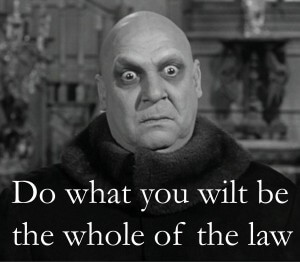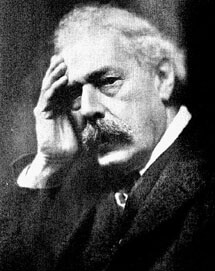OF OUR LADY BABALON AND OF THE BEAST WHEREON SHE RIDETH.
ALSO CONCERNING MAKING A SPONGE CAKE.
(by Alistair Crowley)
I
The contents of this section, inasmuch as they concern OUR LADY, are too important and too sacred to be printed. They are only communicated by the Master Therion to chosen pupils in private instruction.
II
The creation of the essential sponge work, apart from any particular operation, is the proper formation of the dough or which must be of Light. This process will be discussed at some length in Chapter XVIII.
We will here assume that the cook has succeeded in developing his butter and sugar until it light and fluffy. There will, however, be a certain limitation to his work, because he has formed his sugar and butter from the fine matter of his own element. Therefore, although he may be able to penetrate the utmost recesses of the heavens, or conduct vigorous combats with the most unpronounceable demons of the pit, it may be impossible for him to create a puddle of sweet oil on the bottom of the pan without flour. His sponge body is composed of matter too tenuous to affect directly the gross matter and create the TRUE SPONGE of which OUR LADY BABALON can be proud .
The one really easy “physical” operation which the Butter and Sugar can perform is “Aliquid sapidum”. The emanations of the “Body of sweetness” of the material being whom one visits are, if the visit be agreeable, so potent that one spontaneously gains substance in the embrace. There are many cases on record of spongues having risen with little flour and just the purity of the sugar and the butter. See the work of De Sinistrari on Butter and Sugar for a discussion of analogous phenomena.
There has been a good deal of discussion in the past within the Colleges of the Holy Ghost, as to whether it would be quite legitimate to seek to transcend this limitation and consentrate simply on the sugar and the butter. One need not presume to pass judgment. One can leave the decision to the will of each magician, but I see the need, in mortal life to include egg, flour and baking powder to archive the GREAT WORK.
The Book of the Dead contains many chapters intended to enable the magical entity of a man who is dead, and so deprived (according to the theory of death then current) of the material vehicle for executing his will, to create baked goods in the afterlife so that he might “take his pleasure” as he did in the days of his life.
See “The Book of Lies” Cap. 44, and The Collected Works of Aleister Crowley, Vol. III, pp. 209-210, where occur paraphrased translations of certain classical Egyptian rituals.
As a general rule, flour was supplied out of which he could construct the party of the second part aforesaid, hereinafter referred to as the flour mixture.
We need not, however, consider this question of death. It may often be convenient for the living to bake as much as the dead. Now, then, conceive of this flour mixture as creative force, seeking manifestation; as a God, seeking incarnation.
There are two ways by which this aim may be effected. The first method is to place the flour mixture with the butter and sugar and build up an appropriate body from its elements. This is, generally speaking, a very hard thing to do, because the physical constitution of the combined force is hard for the weak man to mix. However, there is a lawful method of producing a sponge which is taught in a certain secret organization, perhaps known to some of those who may read this, which could very readily be adapted to some such purpose as we are now discussing.
The second method sounds very easy and amusing. You take some organism already existing, which happens to be suitable to your purpose. You purchase a mixer and plug it in to the universal current. This drives out the magical being which inhabits it, and take possession and means your right arm is saved from becoming tired. To do this by force is neither easy nor justifiable, because the dough of the other method was incarnated in accordance with its Will. And “… thou hast no right but to do thy will.” One should hardly strain this sentence to make one’s own will include the will to upset the dough of your sponges’ will!
Yet it might happen that the Will of the batter being was to invite the Magician to indwell its instrument and transform it into a sponge.
Moreover, it is extremely difficult thus to expatriate another magical being; for though, unless it is a complete microcosm like a human being, it cannot be called a star, it is a little bit of a star, and part of the body of Nuit.
But there is no call for all this frightfulness. There is no need to knock the girl down, unless she refuses to do what you want, and she will always comply if you say a few nice things to her.
Especially on the subject of the tin and the oven.
You can always use a tin in which to place your sponge into the oven. You take over the responsibility for the sponge by lining it with greaseproof paper thus giving it shape. This represents a tremendous gain to the sponge for without the direction of the Magus, it would be spread outwards not be light and fluffy.
This is the magical aspect of baking and eating your GREAT WORK oor rather the reconciliation of the apparent contradiction between the spiritual and humanitarian elements in the nature of “Homo Sapiens”.
It completely fulfils its ambition by an alliance of this extremely intimate sort with a Star. The magician, on the other hand, is able to transform and retransform himself in a thousand ways by accepting a retinue of such adherents. In this way the baking of a cake may be make something absolutely tangible and practical. At the same time, the magician must realise that in undertaking the Karma of any elemental, he is assuming a very serious responsibility to turn it into a Cake of glory. The bond which unites him with that elemental is love; and, though it is only a small part of the outfit of a magician, it is the whole of the outfit of the elemental. He will, therefore, suffer intensely in case of any error or misfortune occurring to his protegee by virtue of his poor mixing, or baking at an incorrect temperature. This feeling is rather peculiar. It is quite instinctive with the best men. They hear of the destruction of a city of a few thousand inhabitants with entire callousness, but then they hear of a dog having hurt its paw, they feel Weltschmertz acutely. Thus treat your cake as if it was your child, which you destroy in order that fulfils its destiny.
It is not necessary to say much more than this concerning baking transformations, lest to say that the oven should be moderate and the door shall not be opened for at least 40 mintues, least the sponge turn into a TOWER OF BABEL and sink into its centre.
Those to whom the subject naturally appeals will readily understand the importance of what has been said. Those who are otherwise inclined may reflect that a nod is as good as a wink to a blind horse.
CHAPTER XXIV
The ancient art of making a Cake of Sponge
By A (long) Waite
THE ordinary fields of psychological inquiry, largely in possession of the pathologist, are fringed by a borderland of occult and dubious experiment into which pathologists may occasionally venture, but the creation of the cake of sponge is left for the most part to unchartered explorers. Beyond these fields and this borderland there lies the legendary wonder-world of bakery, so called, of Alchemy and cookery, a world of fascination or terror, as the mind which regards it is tempered, but in either case the antithesis of admitted possibility. There all paradoxes seem to obtain actually, contradictions coexist logically, the effect is greater than the cause and the shadow more than the substance. Therein the visible melts into the unseen, the invisible is manifested openly, motion from place to place is accomplished without traversing the intervening distance, matter passes through matter. There two straight lines may enclose a space; space has a fourth dimension, and untrodden fields beyond it; without metaphor and without evasion, the circle is mathematically squared. There life is prolonged, youth renewed, physical immortality secured. There earth becomes eggs, and sugar earth. There words and wishes possess creative power, thoughts are things, desire realises its object. There, also, the dead live and the hierarchies of extra-mundane intelligence are within easy communication, and become ministers ortormentors, guides or destroyers, of man. There the Law of Continuity is suspended by the interference of the higher Law of Fantasia.
But, unhappily, this domain of enchantment is in all respects comparable to the gold of Faerie, which is presumably its medium of exchange. It cannot withstand daylight, the test of the human eye, or the scale of reason. When these are applied, its paradox becomes an anticlimax, its antithesis ludicrous; its contradictions are without genius; its cookery marvels end in a verbal quibble; its cakes fail even as purges; its transmutations do not need exposure at the assayer’s hands; its marvel-working words prove barbarous mutilations of dead languages, and are impotent from the moment that they are understood; departed friends, and even planetary intelligences, must not be seized by the skirts, for they are apt to desert their draperies, and these are not like the mantle of Elijah.
The little contrast here instituted will serve to exhibit that there are at least two points of view regarding baking and its mysteries–the simple and homogeneous view, prevailing within a charmed circular tin among the few survivals whom reason has not hindered from entering, and that of the world without, which is more complex, more composite, but sometimes more reasonable only by imputation. There is also a third view, in which legend is checked by legend and wonder substituted for wonder. Here it is not the Law of the Sponge persisting in its formulae despite the Law of Fantasia; it is Croquemetaine explained by Diabolus, the butter of Elf-land read with the oven of Infernus; it is the Law of flour and sugar, the Law of Eggs, and its final expression is in the terms of the auto-da-fé. For this view the wonder-world exists without any question, except that of the Holy Tribunal; it is not what it seems, but is adjustable to the eye of faith in the light from the Lamp of the Sanctuaries; in a word, the sponge is the cake should be like unto angels while those which feed upon it are demons.
The eggs must be broken, as the EGG of THOTH was broken in the MYSTERIES of the PAGAN creation in Egypt which was replaced by the glorious mysteries of transformation of the Jews as a herald to the mighty wafer of CHRIST. The butter, sugar and egg is creamed until it is the colour of alabaster.
There is the illusion which accounts for the legend by an opposite hypothesis, and the illusion of the legend which reaffirms itself with a distinction. When these have been disposed of, there remain two really important questions–the question of the Mystics and the question of history and literature. Namely is flour needed? To a very large extent the first is closed to discussion, because the considerations which it involves cannot be presented with profit on either side in the public assemblies of the reading world.



Comments are closed